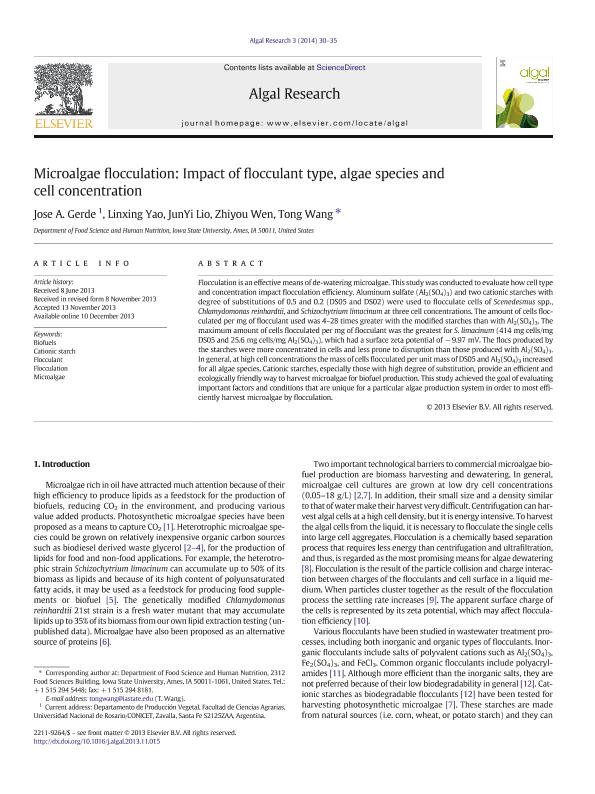Mostrar el registro sencillo del ítem
dc.contributor.author
Gerde, Jose Arnaldo

dc.contributor.author
Yao, Linxing
dc.contributor.author
Lio, JunYi
dc.contributor.author
Wen, Zhiyou
dc.contributor.author
Wang, Tong
dc.date.available
2020-01-10T19:16:53Z
dc.date.issued
2014-01
dc.identifier.citation
Gerde, Jose Arnaldo; Yao, Linxing; Lio, JunYi; Wen, Zhiyou; Wang, Tong; Microalgae flocculation: Impact of flocculant type, algae species and cell concentration; Elsevier; Algal Research; 3; 1-2014; 30-35
dc.identifier.issn
2211-9264
dc.identifier.uri
http://hdl.handle.net/11336/94347
dc.description.abstract
Flocculation is an effective means of de-watering microalgae. This study was conducted to evaluate how cell type and concentration impact flocculation efficiency. Aluminum sulfate (Al2(SO4)3) and two cationic starches with degree of substitutions of 0.5 and 0.2 (DS05 and DS02) were used to flocculate cells of Scenedesmus spp., Chlamydomonas reinhardtii, and Schizochytrium limacinum at three cell concentrations. The amount of cells flocculated per mg of flocculant used was 4-28 times greater with the modified starches than with Al2(SO4)3. The maximum amount of cells flocculated per mg of flocculant was the greatest for S. limacinum (414mg cells/mg DS05 and 25.6mg cells/mg Al2(SO4)3), which had a surface zeta potential of -9.97mV. The flocs produced by the starches were more concentrated in cells and less prone to disruption than those produced with Al2(SO4)3. In general, at high cell concentrations the mass of cells flocculated per unit mass of DS05 and Al2(SO4)3 increased for all algae species. Cationic starches, especially those with high degree of substitution, provide an efficient and ecologically friendly way to harvest microalgae for biofuel production. This study achieved the goal of evaluating important factors and conditions that are unique for a particular algae production system in order to most efficiently harvest microalgae by flocculation.
dc.format
application/pdf
dc.language.iso
eng
dc.publisher
Elsevier

dc.rights
info:eu-repo/semantics/openAccess
dc.rights.uri
https://creativecommons.org/licenses/by-nc-sa/2.5/ar/
dc.subject
BIOFUELS
dc.subject
CATIONIC STARCH
dc.subject
FLOCCULANT
dc.subject
FLOCCULATION
dc.subject
MICROALGAE
dc.subject.classification
Bioprocesamiento Tecnológico, Biocatálisis, Fermentación

dc.subject.classification
Biotecnología Industrial

dc.subject.classification
INGENIERÍAS Y TECNOLOGÍAS

dc.title
Microalgae flocculation: Impact of flocculant type, algae species and cell concentration
dc.type
info:eu-repo/semantics/article
dc.type
info:ar-repo/semantics/artículo
dc.type
info:eu-repo/semantics/publishedVersion
dc.date.updated
2020-01-10T14:59:45Z
dc.journal.volume
3
dc.journal.pagination
30-35
dc.journal.pais
Países Bajos

dc.journal.ciudad
Amsterdam
dc.description.fil
Fil: Gerde, Jose Arnaldo. Universidad Nacional de Rosario. Facultad de Ciencias Agrarias. Cátedra de Cultivo Extensivos Cereales y Oleaginosas; Argentina. Consejo Nacional de Investigaciones Científicas y Técnicas. Centro Científico Tecnológico Conicet - Rosario; Argentina. Iowa State University; Estados Unidos
dc.description.fil
Fil: Yao, Linxing. Iowa State University; Estados Unidos
dc.description.fil
Fil: Lio, JunYi. Iowa State University; Estados Unidos
dc.description.fil
Fil: Wen, Zhiyou. Iowa State University; Estados Unidos
dc.description.fil
Fil: Wang, Tong. Iowa State University; Estados Unidos
dc.journal.title
Algal Research
dc.relation.alternativeid
info:eu-repo/semantics/altIdentifier/doi/https://doi.org/10.1016/j.algal.2013.11.015
dc.relation.alternativeid
info:eu-repo/semantics/altIdentifier/url/https://www.sciencedirect.com/science/article/pii/S2211926413001148
Archivos asociados
